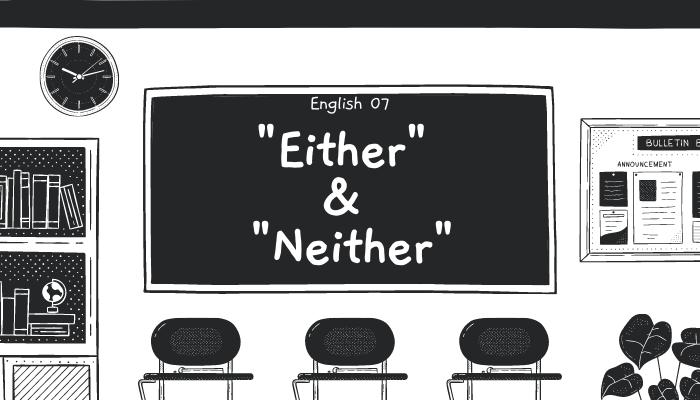Great site to keep my english skills updated for work and travel. I am really enjoying the lessons!
Maria C
 Argentinien
Argentinien


Unterschiedliche Verwendungen von „either“ und „neither“ noch:
• „Either“ bedeutet „both“, „one“ und „neither“ bedeutet „not either“, „none“. „Either“ wird in negativen Konstruktionen verwendet, während „neither“ in positiven Konstruktionen verwendet wird.
- I'm broke. What about you? - I don't have any money. Do you have any?
- I don't have any money either. - I also don't have any money.
- I don't like cricket.
- Neither do I.
- I have never been to Spain.
- I haven't been there either. - I have also never been to Spain.
or Neither have I.
This guy hates Americans, and he doesn't like French people either. This guy does not like Americans, and he also doesn't like French people.
• Either...Or und Neither...Nor
• Either...Or ('one or another') wird in positiven Sätzen verwendet, um eine Wahl zwischen zwei Möglichkeiten anzubieten oder um eine Ursache-Wirkungs-Beziehung auszudrücken:
I can serve you either a hot chocolate, or a glass of chilled white wine. You can choose between hot chocolate and chilled white wine.
Either you tell me everything you know, or I'll take you to court. You have two options: you tell me everything you know, or I'll take you to court.
• Neither...Nor ('not this one and not that one') wird in negativen Konstruktionen verwendet:
I have neither the time nor the patience to listen to your stories. I do not have the time and I do not have the patience to listen to your stories.
Neither one nor the other. Not this one and not the other one.
„Either“ und „neither“ allein verwendet können auch „one or the other“, „whichever of the two“ / „not this one and not the other one“ oder „not one of the two“ bedeuten:
There are boats on either side of the river. There are boats on both sides of the river.
Neither of my daughters is single. Both my (two) daughters are married.
I can stay, or I can go. Either way, I'll be happy. I can stay, or I can go. I'll be happy whichever option I decide.
Denken Sie daran: "neither" wird im Singular konjugiert:
Neither Kevin nor Philip is gay. Kevin is not gay. Philip is also not gay.
Neither of us has to go to work tomorrow. I do not have to go to work tomorrow. You also do not have to go to work tomorrow.
Überprüfen Sie Ihre Punktzahl - Testen Sie unser kostenloses Englisch-Quiz + erhalten Sie einen kostenlosen Bonus